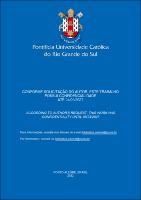| Share record |


|
Please use this identifier to cite or link to this item:
https://tede2.pucrs.br/tede2/handle/tede/10320| Document type: | Tese |
| Title: | A hermenêutica dos vieses cognitivos e sua influência na decisão judicial |
| Author: | Medeiros, Nilton Carvalho Lima de  |
| Advisor: | Castro, Fábio Caprio Leite de |
| Abstract (native): | A presente tese desenvolve a análise dos vieses cognitivos à luz da hermenêutica filosófico e o impacto existente na decisão judicial. Decidir envolve os limites e extensão da decisão, bem como, os elementos em que a decisão deve ocorrer. Partindo da hermenêutica filosófica de Hans-Georg Gadamer debateu-se a atribuição de sentido na decisão judicial e a cautela para o desvirtuamento da pré-compreensão resultando em verdadeira interpretação privada. A interpretação é desenvolvida em três fases em que se observa a fase normativa composta pela tradição e normatização judicial, fase cognitiva constituída pela apreensão de sentido pelo intérprete e a reprodução, em que aplica o produto interpretativo. A pré-compreensão gadameriana representa as bases e preocupações para o que posteriormente passou-se a denominar como vieses cognitivos, ou seja, como concepções prévias podem vir a condicionar decisões inicialmente tomadas e/ou tidas como corretas. Importante destacar que não se deve combater ou criticar a pré-compreensão, de per si. Cada sujeito possui conhecimentos, experiências, preferências, o que é natural e impossível de desvencilhar. O combate a ser realizado diz respeito a tomar decisões automáticas que representem preferências e interesses do julgador. Com o desenvolvimento interdisciplinar, passou-se a disciplinar automatismos, ganhando destaque as publicações de Daniel Kahneman e Amos Tversky. Os autores separam nossa atuação em Sistema 1, sendo rápido, impulsivo, emotivo, e Sistema 2, lento, reflexivo. As pré-compreensões, existentes no Sistema 1 em decisões automáticas, puderam ser mais bem estudadas e como impactam em nossa tomada de decisão. Com isso, desenvolveu-se a importância de nossas pré-compreensões, como podem conferir decisões enviesadas, bem como, o estudo dos principais vieses cognitivos e as possibilidades de desenviesamento (debiasing). |
| Abstract (english): | This thesis develops the analysis of cognitive biases at the philosophical hermeneutics and the existing impacto n the judicial decision. Deciding involves the limits and extention of the decision, as well as the elements which the decision must take place. Starting from the philosophical hermeneutics of Hans-Georg Gadamer, the attibution of meaning in the judicial decision and the caution for the distortion of pre-underestanding resulting in a true private interpretation. The interpretation is developed in three phases in which the normative phase is composed by the tradition and judicial regulation, the cognitive phase constituted by the apprehension of meaning by the interpreter, and the reproduction, in which the interpretetive product is applied. The gadameriana pre-underestanding representes the bases and concerns for the cognitive biases, that is, how preconceptions can come to condition decisions initially taken and/or considered correct. It is important to enphasize that one should not criticize preunderestandig in isolation. Each subject has knowledge, experiences, preferences, which is natural and impossible to disentagle. The criticism to be carried out concerns making automatic decisions that represent the judge’s preferences and interests. With the interdisciplinar development, automatisms began to be disciplined, with the ublications of Daniel Kahneman and Amos Tversky gaining prominence. The authors separate our performance into System 1, being fast, impulsive, emotional, and System 2, slow, reflective. The pre-understandings, existing in System 1 in automatic decisions, could be better studied and how they impact our decision making. With this, the importance o four pre-understandigs was developed, as they can confer biased decisions, as well as the study of the main cognitive biases and the possibilities of debiasing. |
| Keywords: | Decisão Judicial Vieses Cognitivos Debiasing |
| CNPQ Knowledge Areas: | CIENCIAS HUMANAS::FILOSOFIA |
| Language: | por |
| Country: | Brasil |
| Publisher: | Pontifícia Universidade Católica do Rio Grande do Sul |
| Institution Acronym: | PUCRS |
| Department: | Escola de Humanidades |
| Program: | Programa de Pós-Graduação em Filosofia |
| Access type: | Acesso Aberto |
| Fulltext access restriction: | Trabalho será publicado como artigo ou livro |
| Time to release fulltext: | 60 meses |
| Date to release fulltext: | 24/06/2027 |
| URI: | https://tede2.pucrs.br/tede2/handle/tede/10320 |
| Issue Date: | 29-Mar-2022 |
| Appears in Collections: | Programa de Pós-Graduação em Filosofia |
Files in This Item:
| File | Description | Size | Format | |
|---|---|---|---|---|
| TES_NILTON_CARVALHO_LIMA_DE_MEDEIROS_CONFIDENCIAL.pdf | NILTON_CARVALHO_LIMA_DE_MEDEIROS_TES | 635.79 kB | Adobe PDF |  Download/Open Preview |
Items in DSpace are protected by copyright, with all rights reserved, unless otherwise indicated.




